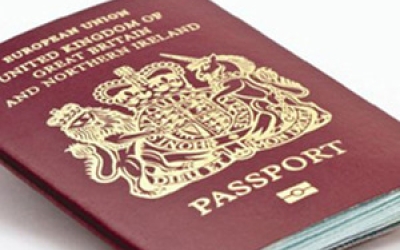Shamima Begum loses appeal against British citizenship deprivation

The Court of Appeal has upheld the UK government’s decision to remove Shamima Begum’s British citizenship.
All three appeal judges on Friday ruled against UK-born Begum and said then-home secretary Sajid Javid's decision in 2019 to take away her citizernship on national security grounds was lawful.
Begum was 15 when she left London with two school friends and travelled to Islamic State group-controlled Syria in 2015.
“It could be argued that the decision in Ms Begum’s case was harsh,” said Lady Chief Justice Sue Carr as she delivered the judgment at the London court.
“It could also be argued that Ms Begum is the author of her own misfortune. But it is not for this court to agree or disagree with either point of view.
Stay informed with MEE's newsletters
Sign up to get the latest alerts, insights and analysis, starting with Turkey Unpacked
“Our only task is to assess whether the deprivation decision was unlawful. We have concluded it was not and the appeal is dismissed.”
The judgment was criticised by rights groups, which have campaigned against the UK government's expansive use of citizenship-stripping powers against British nationals who travelled to Syria during the country's civil war.
Sabah Hussain, migration and citizenship lead at Rights and Security International, said: "This is a deeply disappointing decision from the Court of Appeal to uphold the removal of Begum's British citizenship – a permanent, life-altering move that leaves her exposed to torturous and life-threatening conditions in an unstable and violent camp.
"The failure to recognise the realities of statelessness and the disregard for due process highlight the urgent need for reforms to the UK's deprivation legislation."
Begum was stripped of her citizenship after she was found in northeastern Syria, held in a camp for the families of suspected IS fighters and people fleeing IS territory as western-backed Kurdish-led forces defeated the militant group.
Both of the school friends with whom she had travelled to Syria from their home in Bethnal Green, east London, Amira Abase and Kadiza Sultana, had by then been killed.
She has since remained in the camp, where she gave birth to a baby who died weeks later. Begum had previously said that she had lost two other children, also born in Syria.
The UK and citizenship-stripping powers
+ Show - HideThe UK has been described by researchers as a “global leader in using citizenship deprivation as a counterterrorism measure”.
Historic citizenship-stripping powers targeted at naturalised citizens on disloyalty grounds had largely fallen into disuse prior to 2002, when the government introduced new measures in an attempt to revoke the citizenship of Abu Hamza, an Egyptian-born cleric subsequently convicted of terrorism in the US.
The 2002 legislation allowed for British-born nationals as well as naturalised citizens to lose their nationality rights. Successive governments gradually broadened the scope of the powers so that home secretaries can now deprive anyone of citizenship if they are satisfied that doing so is “conducive to the public good” and would not leave an individual stateless.
No criminal conviction is required. Letters often state that individuals have been assessed as presenting “a risk to the national security of the United Kingdom”.
The government’s use of the powers surged to unprecedented levels in response to the perceived threat posed by British nationals returning from Syria.
Between 2010 and 2015, 33 people were stripped of their citizenship, according to Home Office figures. In 2016, 14 people were deprived, and in 2017 the number jumped to 104.
In 2018, the figure was 21, and in in 2019 - when Shamima Begum was among those targeted - it was 27. It then dropped to ten in 2020 and eight in 2021.
Some subjects of citizenship-stripping orders argue that they have been left effectively stateless, because the government bases its assessment that they are dual nationals on a right of citizenship to a parent’s country of birth, even if they have never taken up that citizenship or even visited the country.
In some cases the Special Immigration Appeals Commission, which rules on citizenship cases, has agreed: it has ruled in favour of British nationals of Bangladeshi descent on the grounds that Bangladesh does not consider them citizens if they have not claimed Bangladeshi nationality before the age of 21.
Human rights organisations and lawyers have compared the powers to “medieval exile and banishment”. Critics also point out that the powers create a two-tier system in which only those deemed to be dual nationals are at risk of losing their British citizenship; a measure that discriminates against naturalised citizens, immigrants and their children.
In 2022, Begum's lawyers told the Special Immigration Appeals Court she was a victim of human trafficking and that Britain created a "two-tier" system of citizenship by taking away her passport.
Maya Foa from Reprieve said today's ruling is another "episode [that] shames ministers who would rather bully a child victim of trafficking than acknowledge the UK’s responsibilities."
Stripping citizenship in bulk and abandoning British families in desert prisons is a terrible, unsustainable policy designed to score cheap political points. Rather than demonise Shamima Begum, ministers should reckon with the institutional failures that enabled ISIS to traffic vulnerable British women and girls," Foa said in a statement.
"What the courts have recognised today is that this was a political decision. It is now a political problem, and the government holds the key to solving it. If the government thinks that Shamima Begum has committed a crime, she should be prosecuted in a British court. Citizenship stripping is not the answer.”
Begum's lawyers also said she had been groomed online and trafficked to Syria to join the militant group.
But lawyers representing the UK government hit back at the claims and said then-Home Secretary Sajid Javid revoked her citizenship on national security grounds.
The British government argues that Begum, born in the UK, is entitled to Bangladeshi citizenship through her parents. However, Bangladeshi authorities have rejected claims she is a Bangladeshi national.
Dan Squires, representing Begum, told the court that she could face the death penalty if sent to Bangladesh and that she has been left effectively stateless.
Home Office documents shared with the court showed that Begum's "de jure statelessness" was confirmed only the day before her citizenship was revoked.
In its judgment on Friday, the Court of Appeal accepted that Javid had relied on the assessment that Begum would not be left de jure stateless because she retained a right to Bangladeshi citizenship at the time when the decision was made. It said it was not necessary for him to also consider whether Begum's circumstances meant she was left de facto stateless.
Commenting on the judgment, Anas Mustapha, head of public advocacy at rights group Cage International, said: “Following today’s failed appeal, the courts have consistently failed to provide any sort of checks and balances on the government’s abuse of the citizenship deprivation policy.
"Across the board and especially in the case of Shamima Begum, most fair observers would appreciate how this is an egregious power that is inherently racist. The courts are shown to be at best inept at providing a check on the excesses of the executive, and at worst complicit in the abuse of power against citizens.”
Middle East Eye delivers independent and unrivalled coverage and analysis of the Middle East, North Africa and beyond. To learn more about republishing this content and the associated fees, please fill out this form. More about MEE can be found here.






